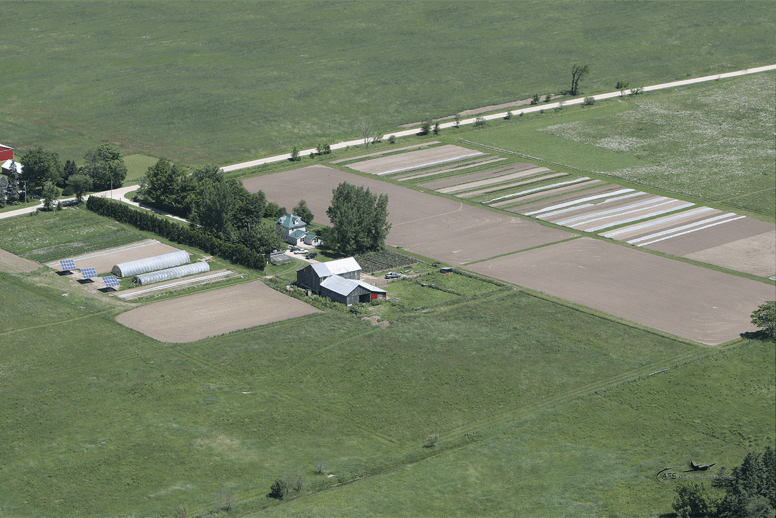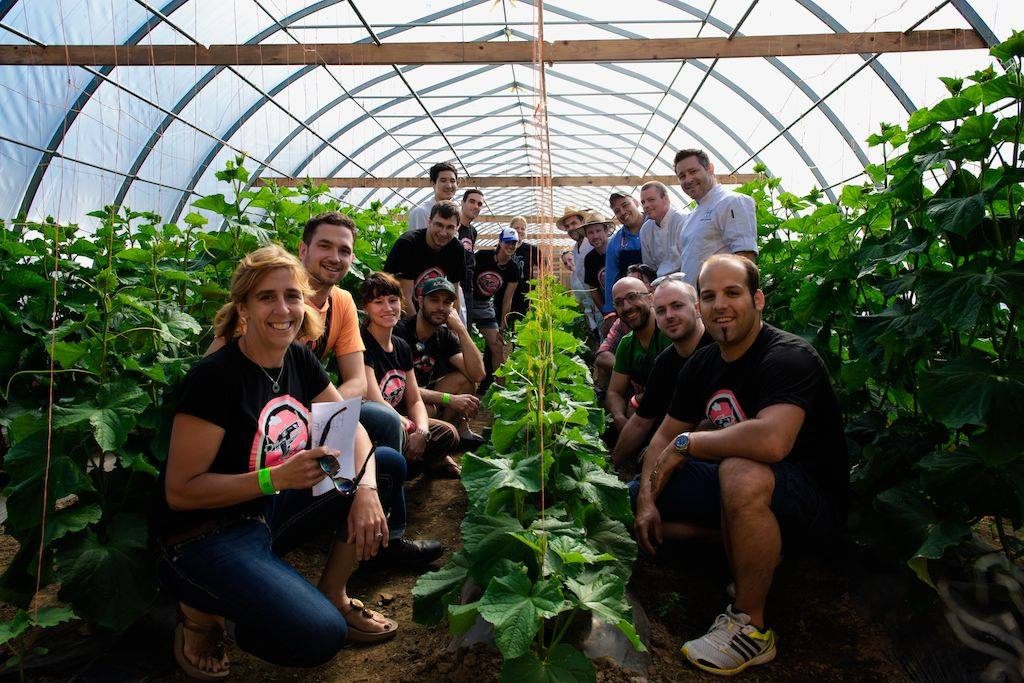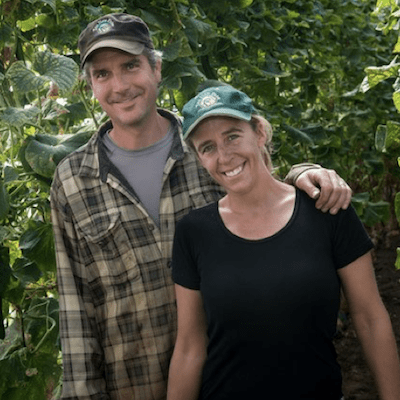Written by Victoria Lesy, Matt Orton, Abdul-Rahim Abdulai, Nicole Unterlander, Abigail Van Reisen from the Arrell Food Institute, University of Guelph; in collaboration with Thorsten Arnold, EFAO.
This story is part of a series of case studies documenting the experience of 6 EFAO member farmers as they adapt to climate change on their farms.
Brent Preston and his wife Gillian Flies have been running a certified organic farm in Creemore, Ontario, for over 15 years. Selling through a wholesaler to independent retailers and restaurants, their salad-based business brings great success as a result of hard work and dedication, access to a distribution infrastructure and urban buyer networks, and perseverance amidst trying times in the past and present. While many challenges come and go, Brent believes that, with a persistent and growing issue like climate change, they are only starting to learn how to live with it.
From increasing hotter summers to violent storms to delayed planting periods, there has been much variability and unpredictability for their farm business over the years:
“The first decade we were farming we could pretty consistently grow spinach right through the summer. The last few years, however, we’ve had spinach crop failures in mid-season when we’ve planted in late June and July, even with heat-adapted varieties. This coming season we’re not even bothering with planting spinach in the middle of the summer. Just plant and sell it early and late season.”
So how is the everyday farm operation impacted by the situation? Brent stipulates that many aspects have gone downhill; for this reason, life as a farmer has continued to be full of uncertainty because every decision can be hindered by unknown consequences:
“With every decision that we make on our farm, we are thinking in the back of our minds: What is it going to be like to farm in 10 years? Are we going to be able to continue doing what we’re doing? Is the kind of extreme weather that we’re experiencing [going to] get worse? And how is it going to impact our business? So, for sure, [climate change is at the] top of [our] mind all the time in all of the decisions that we make, especially for investments.”
Gillian and Brent are continually adjusting their operations in order to adapt. If there is anything that keeps their farm moving, it’s their ability to accept new realities, look forward, and put in place new strategies through diligent planning and adopting an encompassing approach, both on and off the farm.

One of the salad fields. (The New Farm)
On the farm, both new practices and investments have been instrumental in this habituating process. To offset the impact of hot summers and the problems of plant success, Brent has invested in a new irrigation system to ensure constant availability of water. This is also complemented by deliberate efforts to move away from heat-sensitive crops. Beyond these, Brent thinks the future of farming lies in ecological approaches and we must change our understanding of the problem to appreciate the value of regenerative farming and carbon sequestration.
“For our farm, we see really clearly that regenerative farming is the future for us and for everybody. So we’re really really focusing on soil health, on protecting our soil, increasing the abundance and diversity of our soil life. [This is] our real main focus going forward because it’ll make our farm more climate resilient.”
Brent also notes that building resilience through these approaches will mean that farmers harness the power of partnership, working with each other and people beyond the agricultural community. Brent and his wife are currently making efforts to build partnerships that can facilitate carbon-friendly practices:
“This year we are going into partnership with a beef farmer near us to get his animals on our farm to graze our cover crops. [We are going to start using more of] these regenerative agricultural techniques that we’re learning about. We are moving towards all of those, partially because we know it’s going to make our farm more climate resilient, but also because we think we have a role to play in the global problem.”

Aerial view of the property. (The New Farm)
Climate change resilience cannot be left to the farmer alone to deal with; so collaborations need to go beyond the farm gate. Off-farm initiatives are critical to ensuring resilience, especially as climate change is more of a global problem, Brent believes. One way he makes this happen is by continuing to have conversations with fellow farmers, customers, organizations and others who are open to the issue. The community is particularly useful; Brent enthusiastically noted, and that explains why the EFAO is such a great support system for ecological farmers in Ontario. Speaking thankfully, he describes:
“I think when dealing with climate change or any other issue for sustainable farmers, the community is really important. So joining organizations like the EFAO and taking advantage of the experience and knowledge of other farmers is [extremely] important. I think that within the small farm community in Ontario there is an incredible sense of community and of support and that farmers are incredibly generous with their knowledge.”
How can external actors like the EFAO and others help reinforce the already hard work being done by Brent and Gillian, and farmers like them? Operating within a niche system like the one ecological farmers are part of can be difficult, Brent noted, and situations get worse when they feel like they have been left to figure it out themselves. But the government, the University of Guelph, and others can learn from EFAO’s farmer-led research, which has proven useful to the community. Ultimately, working together with the sustainable farming community has the potential to enhance climate resilience.

Group shot in the hoop house of the event team for one of their fundraisers. (The New Farm)

